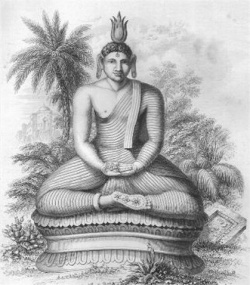Difference between revisions of "Fundamental darkness"
| Line 2: | Line 2: | ||
[[fundamental darkness]] | [[fundamental darkness]] | ||
| − | + | (元品の無明) (Jpn [[gampon-no-mumyo]] ) | |
| − | Also, fundamental [[ignorance]] or primal [[ignorance]]. The most deeply rooted [[illusion]] inherent in [[life]], said to give rise to all other [[illusions]]. Darkness in this [[sense]] means inability to see or recognize the [[truth]], particularly, the true nature of one's [[life]]. The term [[fundamental darkness]] is contrasted with the fundamental nature of [[enlightenment]], which is the [[Buddha nature]] inherent in [[life]]. According to the ShrimalaSutra, [[fundamental darkness]] is the most difficult [[illusion]] to surmount and can be eradicated only by the [[wisdom]] of the [[Buddha]]. [[T'ient'ai]] (538-597) interprets darkness as [[illusion]] that prevents one from [[realizing]] the [[truth]] of the [[Middle Way]], and divides such [[illusion]] into forty-two types, the last of which is [[fundamental darkness]]. This [[illusion]] is only extirpated when one attains the stage of perfect [[enlightenment]], the last of the [[fifty-two stages of bodhisattva practice]]. [[Nichiren]] (1222-1282) interprets [[fundamental darkness]] as [[ignorance]] of the ultimate Law, or [[ignorance]] of the fact that one's [[life]] is essentially a manifestation of that Law, which he identifies as Nam-myoho-renge-kyo. In The Treatment of Illness, [[Nichiren]] states: "The [[heart]] of the [[Lotus]] school is the [[doctrine]] of three thousand [[realms]] in a single moment of [[life]], which reveals that both good and [[evil]] are inherent even in those at the highest stage of perfect [[enlightenment]]. The fundamental nature of [[enlightenment]] manifests itself as [[Brahma]] and [[Shakra]], whereas the [[fundamental darkness]] manifests itself as the [[devil]] king of the sixth heaven" (1113). [[Nichiren]] thus regards [[fundamental darkness]] as latent even in the [[enlightened]] [[life]] of the [[Buddha]], and the [[devil]] king of the sixth [[heaven]] as a manifestation or personification of [[life]]'s [[fundamental darkness]]. The Record of the Orally Transmitted Teachings reads, "[[Belief]] is a sharp sword that cuts off [[fundamental darkness]] or [[ignorance]]." | + | Also, fundamental [[ignorance]] or primal [[ignorance]]. The most deeply [[rooted]] [[illusion]] inherent in [[life]], said to give rise to all other [[illusions]]. Darkness in this [[sense]] means inability to see or recognize the [[truth]], particularly, the [[true nature]] of one's [[life]]. The term [[fundamental darkness]] is contrasted with the fundamental nature of [[enlightenment]], which is the [[Buddha nature]] inherent in [[life]]. According to the ShrimalaSutra, [[fundamental darkness]] is the most difficult [[illusion]] to surmount and can be eradicated only by the [[wisdom]] of the [[Buddha]]. [[T'ient'ai]] (538-597) interprets darkness as [[illusion]] that prevents one from [[realizing]] the [[truth]] of the [[Middle Way]], and divides such [[illusion]] into forty-two types, the last of which is [[fundamental darkness]]. This [[illusion]] is only extirpated when one attains the stage of perfect [[enlightenment]], the last of the [[fifty-two stages of bodhisattva practice]]. [[Nichiren]] (1222-1282) interprets [[fundamental darkness]] as [[ignorance]] of the [[ultimate]] Law, or [[ignorance]] of the fact that one's [[life]] is [[essentially]] a [[manifestation]] of that Law, which he identifies as [[Nam-myoho-renge-kyo]]. In The Treatment of Illness, [[Nichiren]] states: "The [[heart]] of the [[Lotus]] school is the [[doctrine]] of three thousand [[realms]] in a single moment of [[life]], which reveals that both good and [[evil]] are inherent even in those at the highest stage of perfect [[enlightenment]]. The fundamental nature of [[enlightenment]] [[manifests]] itself as [[Brahma]] and [[Shakra]], whereas the [[fundamental darkness]] [[manifests]] itself as the [[devil]] king of the sixth [[heaven]]" (1113). [[Nichiren]] thus regards [[fundamental darkness]] as latent even in the [[enlightened]] [[life]] of the [[Buddha]], and the [[devil]] king of the sixth [[heaven]] as a [[manifestation]] or personification of [[life]]'s [[fundamental darkness]]. The Record of the Orally Transmitted Teachings reads, "[[Belief]] is a sharp sword that cuts off [[fundamental darkness]] or [[ignorance]]." |
{{R}} | {{R}} | ||
Revision as of 17:51, 25 August 2013
(元品の無明) (Jpn gampon-no-mumyo )
Also, fundamental ignorance or primal ignorance. The most deeply rooted illusion inherent in life, said to give rise to all other illusions. Darkness in this sense means inability to see or recognize the truth, particularly, the true nature of one's life. The term fundamental darkness is contrasted with the fundamental nature of enlightenment, which is the Buddha nature inherent in life. According to the ShrimalaSutra, fundamental darkness is the most difficult illusion to surmount and can be eradicated only by the wisdom of the Buddha. T'ient'ai (538-597) interprets darkness as illusion that prevents one from realizing the truth of the Middle Way, and divides such illusion into forty-two types, the last of which is fundamental darkness. This illusion is only extirpated when one attains the stage of perfect enlightenment, the last of the fifty-two stages of bodhisattva practice. Nichiren (1222-1282) interprets fundamental darkness as ignorance of the ultimate Law, or ignorance of the fact that one's life is essentially a manifestation of that Law, which he identifies as Nam-myoho-renge-kyo. In The Treatment of Illness, Nichiren states: "The heart of the Lotus school is the doctrine of three thousand realms in a single moment of life, which reveals that both good and evil are inherent even in those at the highest stage of perfect enlightenment. The fundamental nature of enlightenment manifests itself as Brahma and Shakra, whereas the fundamental darkness manifests itself as the devil king of the sixth heaven" (1113). Nichiren thus regards fundamental darkness as latent even in the enlightened life of the Buddha, and the devil king of the sixth heaven as a manifestation or personification of life's fundamental darkness. The Record of the Orally Transmitted Teachings reads, "Belief is a sharp sword that cuts off fundamental darkness or ignorance."
